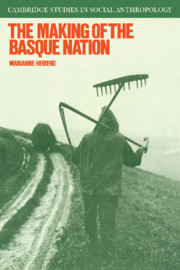Book contents
- Frontmatter
- Contents
- List of maps
- Preface
- Introduction: empire and the emergence of Spain
- Part 1 From plurality to Basque ethnic solidarity
- 1 The Basques in history
- 2 The foundations of the modern Basque country
- 3 History as myth
- 4 From the illuminated few to the Basque moral community
- 5 The moral community and its enemies
- 6 ‘España, una, libre y grande’
- 7 The moral community, from clandestinity to power
- Part 2 Inside the moral community: the village of Elgeta, Guipúzcoa
- Postscript
- Conclusion: ethnic nationalists and patron–clients in Southern Europe
- Notes
- Biblography
- Index
- Cambridge Studies in Social Anthropology
7 - The moral community, from clandestinity to power
Published online by Cambridge University Press: 19 October 2009
- Frontmatter
- Contents
- List of maps
- Preface
- Introduction: empire and the emergence of Spain
- Part 1 From plurality to Basque ethnic solidarity
- 1 The Basques in history
- 2 The foundations of the modern Basque country
- 3 History as myth
- 4 From the illuminated few to the Basque moral community
- 5 The moral community and its enemies
- 6 ‘España, una, libre y grande’
- 7 The moral community, from clandestinity to power
- Part 2 Inside the moral community: the village of Elgeta, Guipúzcoa
- Postscript
- Conclusion: ethnic nationalists and patron–clients in Southern Europe
- Notes
- Biblography
- Index
- Cambridge Studies in Social Anthropology
Summary
The radical nationalism of Sabino de Arana had its origins in the initial process of Basque industrialization. It was propelled by those social sectors who had become threatened by and trapped between the two main protagonists of Basque industrialization – the Basque financial oligarchy and the Spanish immigrant proletariat. Basque nationalism was a movement of vindication by those classes that had been pushed aside by Basque industrial history.
In many ways the Franco period was a variation on the same theme. Spreading industrialization transformed whole new sectors of Basque society into industrial producers. Although increasingly prosperous, these people lacked all political voice. They saw in the Franco regime and the new flood of Spanish immigrants the root causes of their political disenfranchisement.
During the postwar period nationalism was cherished in many families as a domestic tradition ‘imbibed with the mother's milk’. But denied all possibility of cultural or political expression, the Basque nationalist community lay dormant. Its revival was gradual and coincided with the slow liberalization of the Franco regime from the mid-1950s onwards. The main agent responsible for its public awakening was, predictably, radical nationalism, this time carried by Euzkadi' ta Askatasuna (ETA, Euzkadi and Liberty). The means used were, on the one hand, the engagement of growing numbers of the Basque population in direct, violent confrontation with the Franco regime and, on the other, the resurrection of nationalism's cultural infrastructure.
Information
- Type
- Chapter
- Information
- The Making of the Basque Nation , pp. 103 - 130Publisher: Cambridge University PressPrint publication year: 1989
